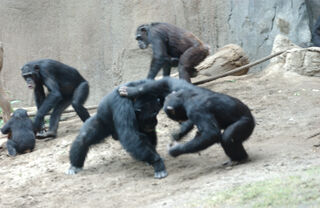Punishment
Who Is Guilty?
Why do we look for someone to hold responsible when bad things just happen?
Posted May 21, 2020 Reviewed by Matt Huston
So far we’ve considered mathematical reasoning and planning for the future in the animal kingdom, but one trait that humans might get to claim for their own is third party punishment. Imagine, an offender has harmed a victim, and a third party—who actually has nothing to do with the situation at hand—intervenes.
This is a remarkable behavior, because the third party must invest time and energy to judge, although the whole thing is not really their concern, at least in the immediate sense. Biologically speaking, the third party—the judge—is incurring costs, although he or she receives no benefit from it. And yet humans do it all the time. Why?
The answer is that there is a long-term benefit for the third party. Our societies are based on cooperation, and danger comes from free riders and cheaters. If people reject the rules and refuse to cooperate, the system of cooperation collapses.
To investigate such scenarios, economic researchers use, for example, the "public-goods game." In this game, two or more players have a certain amount of money at their disposal, say $5. In every round, each player can pay into the public purse as much as they like. The total amount of money in the public purse is then doubled and each player gets paid the same amount. In this scenario, it is best for the public if I invest my entire $5 into the public purse—but I personally would do even better if I kept my money and let the others diligently pay into the system. Then I would claim the most resources: my $5 plus my share of the public purse. This is exactly how typical free riders behave. But if all the players do this, the public purse remains empty and nobody benefits. Cooperation breaks down.
In the first round, almost everyone cooperates. Immediate cheaters are pretty rare; in fact, most people act as conditional cooperation partners. Rather than treating others as they would like to be treated, conditional cooperation partners follow the motto "treat others the way they treat you." When they notice that someone is not investing, they also stop. In the end, all the players follow the trend and the public purse remains empty. This breakdown of cooperation almost always occurs after several rounds in the public-goods game—and you can surely think of a few examples from real life.
The situation is completely different when punishment is possible. Then cooperation works, and everyone invests in the common good. In this version of the public goods game, there is a third party, an observer. This observer also has a certain amount of money, but does not participate in the rounds of investment and payouts. Rather, the observer acts as a judge and can decide to punish the players. To do this, the judge must invest his or her own money, which will not be paid back. People do that (Fehr and Fischbacher 2004; Fehr and Fischbacher 2003; Fehr and Gächter 2002). They invest their own money to address injustices!

Does this happen in non-human animals? In birds, fish, social insects and primates, processes have been observed that indicate some form of punishment. For example, chimpanzees like to see someone punished who was mean to them before (Mendes et al 2018). Moreover, macaque and chimpanzee groups have dominant members who intervene in conflicts in the group. In fact, group conflicts increase when the dominant individual is removed. But whether this ‘punishment’ is better categorized as a method of asserting dominance or as concern for the group remains unclear (Clotton-Brock and Parker 1995).
In Leipzig, third party punishment was tested directly in chimpanzees. The question was whether a dominant chimpanzee, a “judge,” would punish a “thief” when this thief has stolen food from a "victim." The victim had a table with tasty grapes and food pellets in front of him. Between the table and the chimpanzee was a cage wall, so the victim couldn’t take all the food at once, but had to collect the food pieces one by one through the mesh.
But the thief, using a rope, could pull the whole table away from the victim and empty it. The potential judge, also equipped with a tool to reach the table, could watch the whole scene and intervene by knocking the table over, if he wanted. In this way, although the victim might not get the food back, the thief would still be punished—as an easy snack would then be off the table, pun intended. But the researchers in Leipzig found that the observing chimpanzees did not intervene, not even when they were closely related to the victim, for example if food was stolen from their child or their sibling (Riedl et al 2012).
Thus, punishment of injustice by third parties may be a uniquely human phenomenon. That is why we establish legal courts in which independent judges invest energy to punish offenders who haven’t harmed them directly. On the other hand, third party punishment is the motivation behind the distinctly human principle of blood revenge, in which the killing of a victim is avenged by killing the offender—or the offender’s family. This again means that a third party must be inserted into the conflict between offender and victim.
Maybe our unique motivation to punish has even subtler side effects, for example, that we have a hard time accepting that a virus, which we cannot hold accountable, is changing our lives. Perhaps this is why we are so ready to look for an offender, a guilty party to hold responsible for the crisis, be it Bill Gates or people in a marketplace in Wuhan.
References
Clutton-Brock, T., & Parker, G. (1995). Punishment in animal societies. Nature, 373(6511), 209-216.
Fehr, E., & Fischbacher, U. (2004). Third-party punishment and social norms. Evolution and Human Behavior, 25(2), 63-87.
Fehr, E., & Fischbacher, U. (2003). The Nature of Human Altruism. Nature, 425(6960), 785-791.
Fehr, E., & Gächter, S. (2002). Altruistic punishment in humans. Nature, 415(6868), 137-140.
Mendes, N., Steinbeis, N., Bueno-Guerra, N., Call, J., & Singer, T. (2018). Preschool children and chimpanzees incur costs to watch punishment of antisocial others. Nature Human Behaviour, 2, 45-51. doi:10.1038/s41562-017-0264-5




